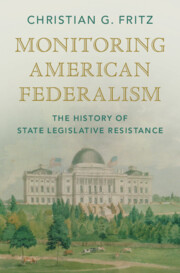‘Fritz’s meticulously researched and timely book reframes our understanding of interposition and shows that it was distinct in important ways from nullification. This book fills a gap in our knowledge of the states’ role in early national federalism, placing the founders’ ideas in context and showing how those ideas were reshaped in the early nineteenth century.’
Alison L. LaCroix - University of Chicago, author of The Interbellum Constitution: Union, Commerce and Slavery in the Age of Federalisms
‘Christian Fritz is one of the most illuminating students of American constitutional development. His latest book, on the theory and practice of state interposition, casts dazzling new light on the complexities of unified constitutional meaning in a fractious federal system.’
Sanford Levinson - University of Texas, author of Framed: America's 51 Constitutions and the Crisis of Governance
‘With perfect timing, Fritz’s book on the history of state legislative resistance hits the market, just as debate about the theory of the independent state legislature heats up, and the Supreme Court considers it. Reading Fritz’s fascinating examination of state legislative actions should fill the need for accurate history absent from the debate thus far.’
Maeva Marcus - Research Professor of Law, The George Washington University
‘In this deftly argued book, Christian Fritz traces the complex ways in which the American states attempted to 'interpose' their authority to challenge federal acts. He explains what the idea of interposition meant to its main author, James Madison, but also why Madison's concept proved so ambiguous and controversial to its interpreters.’
Jack Rakove - Stanford University, author of Original Meanings: Politics and Ideas in the Making of the Constitution
‘… the book succeeds in recovering the history of interposition and documenting its status as one of state governments’ key weapons in their skirmishes with the federal government in the early decades of the republic. Fritz’s prose is crisp and clear, and his voluminous references appear as endnotes in a way that does not slow the reader down but document his insights thoroughly. Readers will learn a tremendous amount about interposition in particular as well as about American political development as it relates to federalism. It should therefore be of interest to both scholars with specific interests in interposition and the early American republic as well as those with a more general interest in how American federalism works.’
John D. Nugent
Source: Publius
‘… an excellent primer on how constitutional meaning developed as the country gained experience with its new constitution…’
John D. Nugent
Source: The Journal of Federalism
‘Monitoring American Federalism is a rich source that likely will become an essential text about the distribution and exercise of constitutional powers for scholars and educators who are experts in the subject matter. Yet it also is accessible to a broader audience of readers, including those who wish to be better informed while navigating real contemporary questions about balancing federal and state power. … a must-read.’
Nicholas Allard
Source: The Journal of Things We Like
‘Professor Fritz has done a great service in unearthing the history of original interposition theory and exploring the divergent interpretations and uses that developed over the decades … Equally his book nicely shows some of the ways that Americans have reshaped the nation’s constitutional law and theory as they sought to manipulate and exploit the indeterminate, built-in tensions in the Constitution’s federal structure. Students of American federalism will find this excellent book a treasure-trove of information, insight, and scholarly inspiration.’
Edward A. Purcell, Jr
Source: Balkin.com
‘Fritz’s prodigiously researched book engages in the vital work of teasing apart meaning from myth, interpretation from invocation. The project is more imperative than ever, given the current urgency for constitutional history to distinguish among meaning, interpretation, continuity, and change.’
Alison L. LaCroix
Source: Balkin.com
‘Christian Fritz’s new book offers a rich exploration of state opposition to perceived unconstitutional acts by the federal government since the Founding. Fritz recovers a tradition of state interposition distinct from the more familiar, and more abhorred, phenomenon of nullification…Monitoring American Federalism can help us make sense of contemporary state resistance to the federal government as well as its lineage.’
Jessica Bulman-Pozen
Source: Balkin.com
‘Monitoring American Federalism … casts tremendous new light on the actualities of the American federal system … Quite literally, every scholar of American constitutional development will have to contend with this book at pains of being deemed illiterate … As a history of ideas - and of political actions - the book is … a stunning contribution… Fritz casts immense light on important aspects of the historical American constitutional order and how we should think about it even today.’
Sandford Levinson
Source: Balkin.com
‘[Fritz] makes a convincing case that no past constitutional practice has suffered more from contemporary modes than federalism. His exploration into the rich history of federalism in the Early Republic reveals how Americans believed the states should be active and significant players in shaping constitutional meaning.'
Aaron Coleman
Source: Law and Liberty
‘This work provides a thorough, well-researched account of one key aspect of American constitutional thought. Because the constitutional past is, for better or worse, always relevant to the political present of the United States, Monitoring American Federalism also raises questions with considerable contemporary relevance.’
Grace Mallon
Source: Law and History Review
‘This well-written volume is an excellent contribution to American history collections. … Recommended.’
D. Schultz
Source: Choice
‘Fritz reveals an overlooked means by which the people, represented in their state legislatures, sought to shape constitutional meaning without ceding that determination to the Supreme Court, on the one hand, or turning to unconstitutional resistance, on the other. Monitoring American Federalism expands our understanding of the history and possibilities of constitutional change. … Fritz’s account of state legislatures’ early practice of protesting federal laws that they perceived to be unconstitutional is a welcome contribution to the growing literature historicizing and problematizing the idea that the Supreme Court alone gets to determine federalism’s contours.’
Jane Manners
Source: American Journal of Legal History



